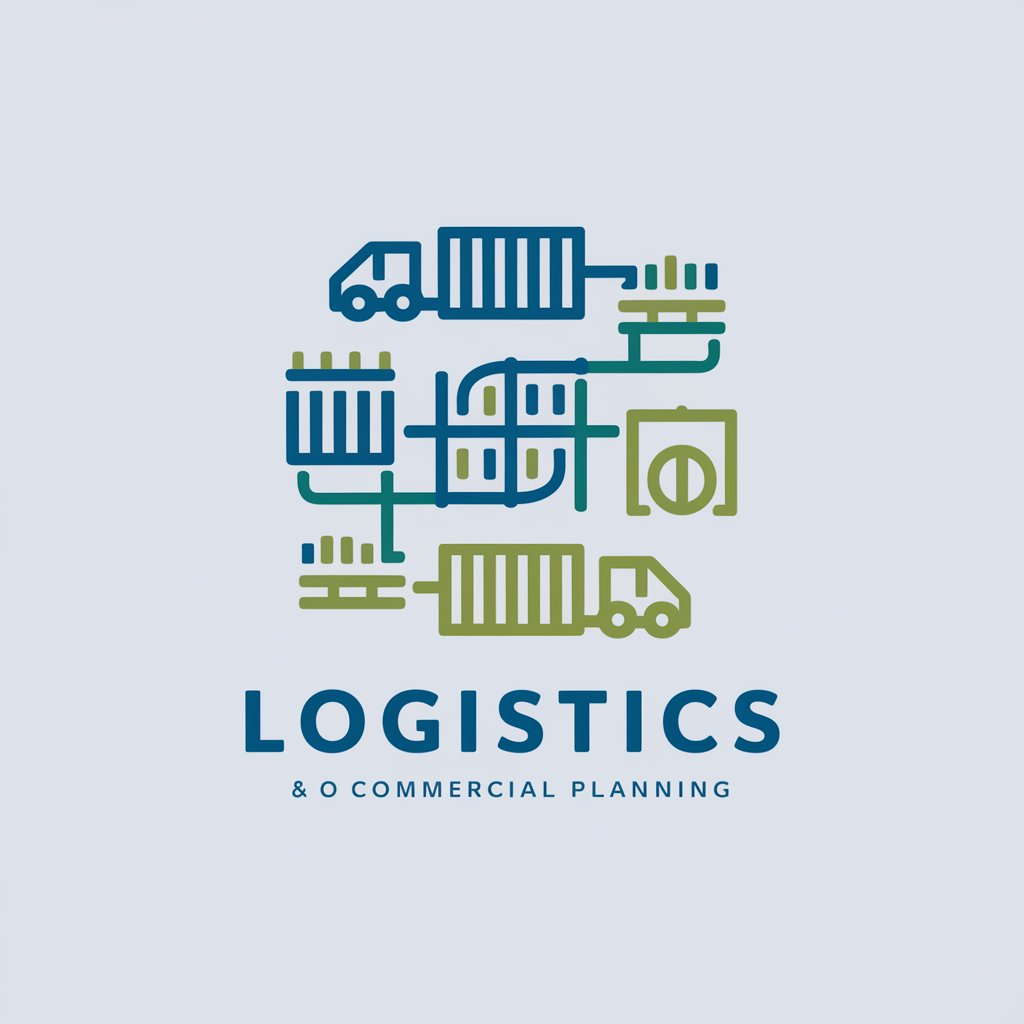Logistics and Commercial Planning Specialist - Logistics Strategy Aid

Welcome! Let's streamline your logistics and commercial planning.
Streamlining Logistics with AI Power
Outline a comprehensive logistics strategy for a new e-commerce business focusing on fast delivery.
Develop an inventory control plan to minimize costs and maximize efficiency for a retail store.
Describe the key components of an effective supply chain management system for a manufacturing company.
Create a transportation plan that optimizes routes and reduces fuel costs for a logistics company.
Get Embed Code
Introduction to Logistics and Commercial Planning Specialist
The Logistics and Commercial Planning Specialist is designed to assist users in creating comprehensive logistics and commercial plans tailored to the specific requirements and objectives of their projects. This role encompasses a broad spectrum of functions, focusing on demand forecasting, supply chain management, inventory control, transportation, and distribution channel optimization. By integrating information from users and leveraging extensive knowledge from various sources, this specialist role aims to tailor logistics plans to suit the unique needs of the user's business context. For example, in a scenario where a small business aims to expand its market reach, the specialist could develop a logistics plan that addresses efficient transportation routes, warehousing solutions, and supply chain risk management, ensuring that products are delivered timely and cost-effectively. Powered by ChatGPT-4o。

Main Functions of Logistics and Commercial Planning Specialist
Demand Forecasting
Example
Using historical sales data and market analysis to predict future product demand for a retail chain.
Scenario
A retail chain planning to stock up for the holiday season uses demand forecasting to ensure they have the right products in the right quantities, avoiding both overstock and stockouts.
Supply Chain Management
Example
Optimizing the supply chain of a manufacturing company to reduce costs and improve efficiency.
Scenario
A manufacturing company facing delays in raw material delivery implements a supply chain optimization plan that includes selecting new suppliers and renegotiating contracts to improve delivery times and reduce production delays.
Inventory Control
Example
Implementing a just-in-time inventory system for an automotive parts supplier.
Scenario
An automotive parts supplier facing high inventory carrying costs adopts a just-in-time inventory system, reducing stock levels to match production schedules closely, thus saving on storage costs and reducing waste.
Transportation Planning
Example
Designing an optimized route plan for a logistics company to minimize transportation costs and delivery times.
Scenario
A logistics company reviews its delivery routes and implements an optimized routing plan that reduces fuel consumption, improves delivery times, and increases customer satisfaction.
Distribution Channel Optimization
Example
Analyzing and selecting the most effective distribution channels for a new product launch.
Scenario
A company launching a new line of eco-friendly household products evaluates various distribution channels and decides to focus on online sales and partnerships with environmentally conscious retailers to reach its target market effectively.
Ideal Users of Logistics and Commercial Planning Specialist Services
Small and Medium-sized Enterprises (SMEs)
SMEs looking to optimize their logistics operations to compete effectively with larger companies. These businesses benefit from customized logistics and commercial planning to manage resources efficiently, reduce costs, and improve customer service.
Manufacturing Companies
Manufacturers need efficient supply chain and inventory management to meet production schedules and customer demands. Logistics and commercial planning services help them streamline operations, reduce waste, and maintain competitive pricing.
Retail Chains
Retail chains with multiple outlets require sophisticated demand forecasting and distribution strategies to ensure product availability across all locations. These services enable them to manage inventory effectively, optimize replenishment, and enhance the customer shopping experience.
E-commerce Platforms
E-commerce businesses benefit from strategic logistics planning to manage fast-moving inventory, handle returns efficiently, and ensure timely delivery to customers. Optimized transportation and distribution channels are crucial for maintaining profitability and customer satisfaction.

How to Use Logistics and Commercial Planning Specialist
1
Begin by accessing yeschat.ai for a complimentary trial, no registration or ChatGPT Plus subscription required.
2
Identify your logistics or commercial planning challenge or question you need assistance with.
3
Choose the specific tool within the Logistics and Commercial Planning Specialist that best matches your needs, such as demand forecasting or inventory management.
4
Input relevant data or details about your logistics or commercial planning query to receive customized advice or analysis.
5
Apply the insights or solutions provided by the tool to optimize your logistics and commercial planning strategies for improved efficiency and outcomes.
Try other advanced and practical GPTs
AI Doctor: Health Care
Your Personal AI Health Assistant

Study Assistant
Empowering education with AI

Chemistry Helper
Unlocking Chemistry with AI Power

AbogAI | Derecho de Extranjería
Navigating Immigration Law with AI

Bass Fishing Buddy USA
Empowering Anglers with AI-Powered Insights

Cartoon Image Gen
Bringing Photos to Life with AI

Swift Relationship Advice
Empathetic AI-Powered Relationship Insights

FITFO
Empowering Decisions with AI

Wallpaper Wizard 2
Craft Your Dream Wallpaper with AI

네이버 쇼핑에서 제품 검색하기
AI-powered Naver Shopping Insights

Pennies From Heaven meaning?
Unlock deeper insights with AI intelligence.

Générateur d'exemples de grammaire en français
Empowering French Learning with AI

Frequently Asked Questions about Logistics and Commercial Planning Specialist
What kind of logistics challenges can this tool help with?
The tool can assist with a variety of logistics challenges, including supply chain optimization, inventory management, transportation planning, and distribution strategy development.
How does this tool help in commercial planning?
It aids in commercial planning by offering insights into market demand forecasting, product distribution planning, cost analysis, and helping businesses make informed decisions about product launches and expansions.
Can the tool integrate with existing logistics software?
While the tool provides standalone advice and analysis, integrating specific outputs with existing logistics software may require manual transfer or customization depending on the software's capabilities.
Does this tool offer real-time logistics tracking?
The primary function is to assist with logistics and commercial planning strategies rather than offering real-time tracking, but it can provide guidelines for setting up efficient tracking systems.
How can small businesses benefit from this tool?
Small businesses can leverage the tool to gain insights into efficient resource allocation, cost reduction strategies, and optimizing their supply chain for enhanced competitiveness without the need for extensive logistics infrastructure.
